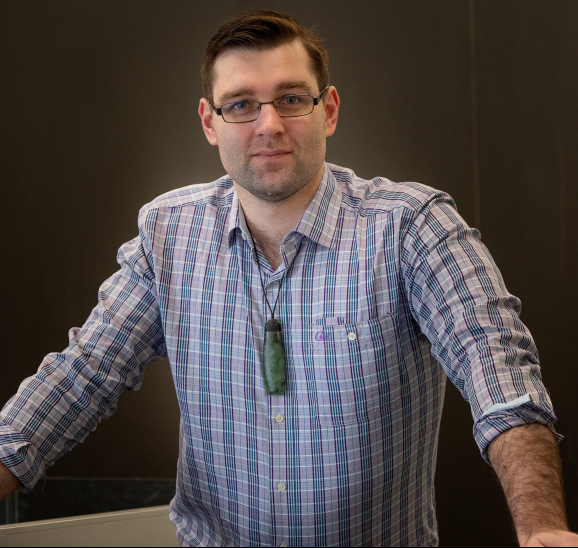Taylor Winter
Investigating how the gut microbiome signals the brain to facilitate emotion regulation.

Taylor Winter
PhD Student
School of Psychology
Profile
Taylor’s focus is on the gut-brain-axis, the many ways by which the plethora of microbes in the gut can influence ones mood and well being. As part of his research, he is investigating how inflammation can explain changes in mood due to microbiome ill-health, how heart rate variability may be a proxy measure of microbiome health, and potential interventions such as probiotics or dietary changes.
He also works as a Senior Data Scientist at Statistics New Zealand, specialising in method development and research using big data with a specific focus on wellbeing and health. This has led to in depth studies of discrimination and stigma using complex nationally representative surveys nationally and overseas. He is an expert in the use of Bayesian statistics for multi-level modelling and structural equation modelling.
For more information about Taylor, please head over to his profile in the following sites:
Qualifications
Master of Science with Distinction (Otago)
Bachelor of Arts (Otago)
Research Interests
- Gut-microbiome
- Stigma and discrimination
- Advanced statistics including Bayesian methods and structural equation modelling
Publications
Riordan, B. C., Winter, T., Flett, J. A. M., Scarf, D., Jose, P., & Conner, T. S. (In Review). Does the Fear of Missing Out (FoMO) moderate the relationship between social networking use and affect? A daily diary study. Computers in Human Behaviour.
Winter, T., Conner, T., & Jose, P. (In Review). Identifying Profiles of Affective Change: An Ecological Momentary Assessment of Flourishers. Emotion.
Winter, T., Riordan, B., Surace, A., & Scarf, D. (2019). The relationship between hazardous alcohol use and discrimination among Māori in Aotearoa New Zealand. Addiction.
Surace, A., Riordan, B., & Winter, T. (2019). Do New Zealand sexual minorities engage in more hazardous drinking than non-sexual minorities? Drug and Alcohol Review.
Pittar, N., Winter, T., Falland-Cheung, L., Tong, D., & Waddell, J. N. (2018). Scalp simulation – A novel approach to site-specific biomechanical modeling of the skin. Journal of the Mechanical Behavior of Biomedical Materials, 77, 308–313. https://doi.org/10.1016/j.jmbbm.2017.09.024
Falland-Cheung, L., Waddell, J. N., Lazarjan, M. S., Jermy, M. C., Winter, T., Tong, D., & Brunton, P. A. (2017). Use of agar/glycerol and agar/glycerol/water as a translucent brain simulant for ballistic testing. Journal of the Mechanical Behavior of Biomedical Materials, 65, 665–671. https://doi.org/10.1016/j.jmbbm.2016.09.034
Franz, E. A., Fu, Y., Moore, M., Winter, T., Mayne, T., Debnath, R., & Stringer, C. (2016). Fooling the brain by mirroring the hand: Brain correlates of the perceptual capture of limb ownership. Restorative Neurology and Neuroscience, 34(5), 721–732.
Tong, D. C., Winter, T. J., Jin, J., Bennett, A. C., & Waddell, J. N. (2015). Quantification of subconcussive impact forces to the head using a forensic model. Journal of Clinical Neuroscience, 22(4), 747–751. https://doi.org/10.1016/j.jocn.2014.11.018
Winter, T. J., & Franz, E. A. (2014). Implication of the anterior commissure in the allocation of attention to action. Frontiers in Psychology, 5. https://doi.org/10.3389/fpsyg.2014.00432
PhD topic
Investigating how the gut microbiome signals the brain to facilitate emotion regulation.
Supervisors:
Professor of Psychology
School of Psychology
Reader
School of Psychology
Associated lab
Positive Psychology Lab
Directed by Paul Jose
Historically Paul has been interested in how children and adolescents cope with the problems in their lives. He assesses stress, coping, and adjustment and examines their interrelationships at one point in time or longitudinally. Recent research has expanded to include issues of cross-cultural and cross-national investigations of how adolescents cope with stressors. Recently he has been turning to issues of positive psychology and positive youth development. Much of Paul's current work focuses on savouring and happiness. He also has a strong interest in methodological issues in general, and statistical moderation and mediation in particular.


